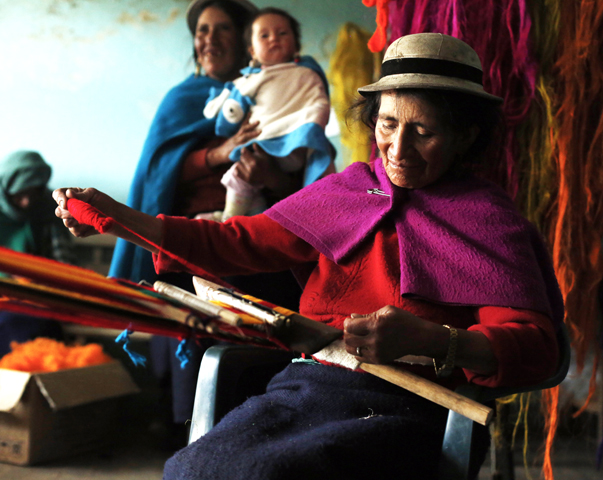

Empowering the world’s indigenous people

24-year-old Fátima Luna had never experienced readily-available, safe drinking water before establishing the village board that brought the precious liquid to her indigenous community in eastern Nicaragua. Climate change-induced drought had forced Ali Hamadu, a pastoralist from eastern Ethiopia, to rely on humanitarian aid to support his family until he joined a coop that helped him restore his herds of livestock.
Lang Thi Kieu, a widow from one of Vietnam’s impoverished ethnic minorities, was able to supplement her meager earnings from farming by starting to raise silk worms with high-yield mulberry crops. And Delma Gonçalves, a member of Brazil’s Kaiowá Guarani indigenous people, regained four hours of every day after she and her husband installed an eco-stove in her home that means she no longer has to walk long distances in search of firewood.
As the United Nations begins 12 days of discussions on the world’s indigenous people, the MDG Achievement Fund is working in 20 countries around the world to help people like Fátima, Ali, Lang Thi and Delma improve their health, preserve their cultures, protect their rights and boost their livelihoods. In the process, it has identified best practices to ensure that, in the push to achieve the Millennium Development Goals, ethnically and culturally appropriate approaches are used so that indigenous people are equally able to benefit.
Sharing best practices
The MDG-F will share these experiences and lessons learned at three side events to the UN 12th session of the Permanent Forum on Indigenous Issues, dealing with the post-2015 Agenda and the importance of traditional knowledge in health and disaster risk reduction. It will also, in conjunction with the National Indigenous Organization of Colombia, present a new set of Millennium Development Goals drawn up by, and representing the values and priorities of, indigenous people -- the first report of its kind worldwide.
There are some 370 million Indigenous people around the globe, constituting just 5 % of the world’s population but 15% of its poor. Largely marginalized and isolated, native people are in worse health than the general population and much less able to influence and participate in political and economic processes that affect them. Though their circumstances differ from region to region, Indigenous people everywhere suffer from higher infant mortality rates than other populations.
To change this status quo, the MDG-Fund has invested US $264 mln in 47 joint programmes in Asia, Africa and Latin America that are improving life for indigenous groups and ethnic minorities.
Closing the inequalities gap
In the Ngöbe-Buglé region of Panama, where 91% of the indigenous population lives in extreme poverty, the MDG-F empowered the people of four villages -- particularly women -- to take charge of the creation, management and maintenance of their own water resources.
In Colombia, joint programmes are improving indigenous children’s health, women’s empowerment and inter-ethnic relations. The MDG-F is also harnessing indigenous people -- including youth -- to find ways of reducing the impact of climate change on indigenous communities, which are particularly vulnerable to environmental degradation.
Indigenous people are the poorest of Cambodia’s poor, living in remote parts of the country and suffering from poor health, lack of education and food insecurity. In an area where a quarter of all children die before reaching the age of five, the MDG-F improved these families’ livelihoods by teaching handicraft weavers business skills that helped them boost sales and increase household incomes.
A program to improve nutrition among Guatemala’s indigenous communities made the beneficiaries -- particularly women -- partners in the process of boosting food production for household consumption and sale.
And in Namibia, the MDG-F worked with members of the San community, the last hunters and gatherers in southern Africa, to take a central role in preserving their cultural heritage through the promotion of tourism, by training tribesmen in financial management and tour guiding.
A new indigenous vision of the MDGs
Through its work with indigenous people, the MDG-F is a pioneer in promoting the idea that the international agenda post-2015, the target date for the current Millennium Development Goals, must include the perspectives of indigenous people.
No development objectives can sustainably be met when profound inequalities persist worldwide, including those that exist between indigenous and non-indigenous people. Arguing that the current eight MDGs do not reflect the priorities and realities faced by native people, the MDG-F is presenting five new goals in a publication “The Other Vision: Indigenous Peoples and the MDG’s”.
The new indigenous goals are: 1) Protection and advocacy of indigenous territory; 2) Self-determination, autonomy and own-governance; 3) Own development -- good living -- balance and harmony; 4) Prior consultation and free informed consent; and 5) Institutional redesign of the state.
Click here to read the full report, “The Other Vision: Indigenous Peoples and the MDG’s”.
Click here to read success stories from our work fighting poverty and inequalities around the world.